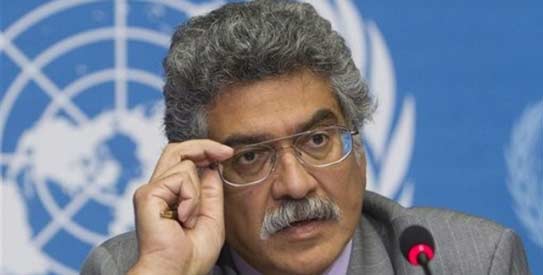– Permanent Representative of Pakistan to the United Nations, Geneva on OHCHR Report on Sri Lanka, 25th Session of the Human Rights Council, 26 March 2014
Mr. President,
My delegation believes in a culture of engagement for ensuring the promotion and protection of human rights. We believe that country-specific initiatives are confrontational and counter-productive and seriously undermine the spirit of cooperation and coordination on important human rights issues.
We believe that the High Commissioner’s Report contained in document A/HRC/25/23 is not balanced and some of the elements including recommendation to establish an international inquiry mechanism exceed the mandate granted by HRC resolution 22/1. We are also disappointed over the discriminate or my approach followed by the OHCHR with regard to placement of Sri Lanka’s comments in response to the report on the extranet.
Mr. President,
Sri Lanka is a country with excellent democratic credentials. It has successfully overcome 30 years of brutal terrorism by the LTTE with external support. Now is the time for international community to help the people of Sri Lanka to heal their wounds and not penalize them for defeating the LTTE at the behest of people who still continue to align themselves with these terrorist forces.
There is also a need to acknowledge the commitment and cooperation, extended by the government of Sri Lanka to the entire human rights machinery.
Since the end of the terrorist conflict in May 2009, Sri Lanka has continued to regularly and voluntarily engage with the Council as well as the Missions based in Geneva on the progress in their reconciliation process. Pakistan lauds the progress achieved by Sri Lanka in implementing the National Plan of Action (NPOA) and recommendations of the Lessons Learnt and Reconciliation Commission (LLRC).
As part of this continued engagement, the High Commissioner undertook a week-long official visit to Sri Lanka from 25 to 31 August 2013 on the invitation of the Government. The Government arranged a comprehensive programme and provided unfettered access during the visit, a fact she herself has acknowledged.
The OHCHR as well as members of the HRC must refrain from advocating a course of action that will exacerbate the challenges that the Sri Lankan people are trying to overcome after 30 years of terrorist and separatist violence.
The international community should act as a facilitator for peace and stability and be part of the solution rather than part of the problem. There is a dire need to comprehend and cooperatively address the enormous challenges being faced by Sri Lanka rather than penalizing the country for rooting out terrorism from its soil.
Thank you.


Leave a comment